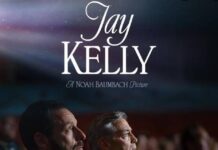In this ninth part of my retrospective Oscar Outlook, I’ll be eliminating a biographical epic, two war films, a racially-charged counterculture flick, the ultimate COVID movie, and one of Billy Wilder’s darkest works.
50. “Gandhi” (1982)
Featuring an epic central performance from Ben Kingsley, “Gandhi” is one of the better long-spanning biopics you’ll see. I believe Richard Attenborough genuinely admires his subject, unlike many modern directors and executives who love cashing in on popular figures to make a buck. It helps that Mahatma Gandhi is about as interesting of a person as there ever was. His peaceful protests were the model for many of the 20th century’s most important thought leaders, and this movie does a good job of depicting his deep convictions. Though shaky with the facts in some spots, “Gandhi” captures the man himself quite well.
49. “From Here to Eternity” (1953)
The kiss scene of “From Here to Eternity” between Burt Lancaster and Deborah Kerr is one of the more iconic images of American cinema, but there’s much more going on here than I had imagined before watching it. The Angelo Maggio (played by Frank Sinatra) strand of the story is definitely the most interesting to me, and its conclusion is stunning. Pulling back, each plot line bleeds well into the next. It culminates, of course, with the chaos of the Pearl Harbor attack, an event that was never more well-captured on film than it is here. Nothing has come close.
48. “Nomadland” (2020)
Making liberal use of documentarian strategies, Chloe Zhao crafted a very 2020 movie in “Nomadland.” There are few Best Picture winners that find a main character so isolated, which played right into the COVID era. Best Actress winner Frances McDormand and David Strathairn lead a standout cast of otherwise non-actors. The real people whose lives are documented in “Nomadland” are not victims, but free people who have found more genuine connection than those of us who live standard lives. “Nomadland” is worth watching as a snapshot into a very specific… not time, but feeling.
47. “The Lost Weekend” (1945)
Billy Wilder doesn’t miss. “The Lost Weekend” is a character study with a noir’s aesthetic, as Ray Milland stumbles through a stretch of days while under the influence of addiction. It was edgy enough that John Lennon referenced the film’s title and, in turn, its subtext when describing his own personal low three decades later. It’s a challenging watch for all the right reasons. More impressive films about addiction have come in the past 80 years, but few are as anxious as Wilder’s 1945 stab at the topic.
46. “In the Heat of the Night” (1967)
Toppling “The Graduate” and “Bonnie and Clyde” for the 1967 Best Picture prize was “In the Heat of the Night,” the first Best Picture nominee to take a semi-responsible, conscious look at race relations. Many other films released since, and even a few of its near contemporaries, handle the material much more interestingly, but “In the Heat of the Night” was still pretty edgy in its day. Sidney Poitier slaps a white man in this film and we weren’t supposed to view that action as the injustice. That’s a step in the right direction.
45. “Platoon” (1986)
With more distance from the war itself, “Platoon” puts into focus the atrocities of Vietnam and the psychological damage it had on the more compassionate soldiers. Not the most memorable effort, I’ll admit, “Platoon” is another movie set during Vietnam that probably means more to another generation than it does to mine. It’s an unfortunate reality that the American military complex breaks both sides of a conflict. In 1986, that was a fairly subversive concept. Now, it’s common knowledge. No matter, “Platoon” is another more grounded alternative to “Apocalypse Now.”
Sam Zavada is counting down his ranking of every Best Picture winner in the history of the Academy Awards in the lead up to this year’s ceremony on March 2. Participate in the Times Leader Readers’ Ballot for the 97th Oscars by filling out the form at https://bit.ly/4hd8n6F. The Readers’ Ballot will close on Friday, Feb. 27, at 8 p.m. and will be revealed in the Saturday, March 1, edition of the Times Leader.
Sam Zavada is counting down his ranking of every Best Picture winner in the history of the Academy Awards in the lead up to this year’s ceremony on March 2.




